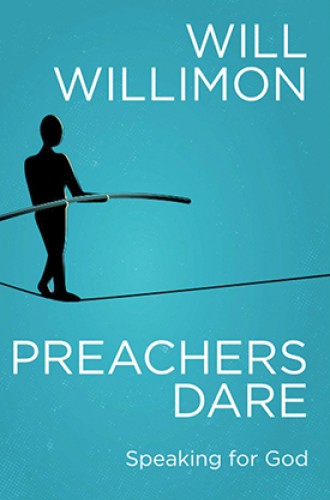Will Willimon issues in this book a Barthian prescription for preachers: forego homiletic taxonomies and dare to proclaim Jesus Christ. Like Willimon’s other books, Preachers Dare is remarkably accessible and light on theological instruction yet uncompromising about its implications. Now is the time for preachers to “‘give witness’ to God’s revelation,” but not through “inchoate hankerings toward the transcendent.” When preachers ascend the pulpit, they must announce the good news in its glorious particularity and inconvenience: a Jew named Jesus who “lived briefly, died violently, rose unexpectedly” has promised to “return to us.”
This mode of preaching is described as daring not because the most effective or memorable sermons have the shock value of current events but because the courage implied by Karl Barth (who wrote in The Göttingen Dogmatics that “Christian preachers dare to talk about God”) is required when “the text is really having its way with you . . . those who have ears to hear will know it.” Fleming Rutledge, to whom Willimon dedicates this book, once said, “If you know you are dying, you will know the word of life when you hear it.” In this spirit, Willimon reflects on a God who “commanded cowards like us to speak of Jesus to the world.”
Read our latest issue or browse back issues.
Preachers Dare is an indictment of counterproductive mainline Protestant practices—especially sentimental preaching, which in its cloying hallmarks “denies human enslavement to evil and sin and reduces the gospel to fantasies of earnest human striving or unjustified positive feelings about human capacity for goodness.” Sentimentality leaves congregations feeling better but never knowing better. As recidivists of what Barth called the “modern misunderstanding,” preachers use sentimentalism to “uncover a connection within the listener’s self and build a bridge to that innate point of contact.” They thus subordinate revelation to individual experience.
Worse, sentimentalism is used as “a gospel substitute of the moment,” a panacea for whatever atrocity is on the news. Willimon writes:
A mass killing? Hand out candles, have a vigil, link arms in the darkness, and declare “this community comes together in times like these.” Racism? “Find somebody of another race and just have a conversation. Discover the richness of this person’s experience. See Christ in them. You’ll be blessed.” The essence of Christianity? “It all boils down to, ‘Love your neighbor as yourself.’ Don’t worry about believing; Christianity is a practice.” Death? “She will live on in our memories.” A pandemic? “We’re going to come out of this as better people.”
Sentimental preaching is at best a losing tactic for coping with global implosion, at worst a surrender of humanity’s lifeline to God.
Stephen Browne, a scholar of American public address, has written that sentimentalism “extends no further than its own exhaustion. This exhaustion, indeed, defines precisely sentimentalism’s dangerous pleasures: once consummated, it dies.” Sentimentalism as a genre gives its audience a way to escape—not from others so much as from its own shortcomings. Willimon might say—and I would agree—that this evasion is a matter of sin and death.
Preachers Dare raises two sets of questions for me. First, Willimon asserts that God is the agent in revelatory preaching. He draws on Barth’s insight that every gift (Gabe), particularly of knowledge of God, is also an assignment (Aufgabe), concluding that the task of preachers is to pray for assistance from the Holy Spirit as they craft sermons. What, then, is the function of homiletical (and hermeneutic) skill? Citing John 20:1–18, Willimon refers to Mary Magdalene as “the first preacher,” and this acknowledgment will be gratifying for many readers. Still, her person as well as her apostolic role call for a deeper inquiry than Willimon affords into the definition of speech and its various layers in the preaching task.
Second, what distinctions might daring preachers draw among various modes of dialogue? Willimon tells us that a “dialogical approach” designates two parties, the homilist and the audience. In such preaching, God is uninvited and “made mute.” This approach is “typical of a privileged church that thinks it’s already Christian and a suitable partner for dialogue with God without need of the church’s continuing conversion.” Yet Willimon does not reconcile this critique with his reliance elsewhere on how “Barth overcomes the modern subject-object split by stressing the continuing, dialogical, dynamic nature of knowledge of God as that which comes in relationship” (Conversations with Barth on Preaching, 2006). Of what value, one must ask, is dialogue for the purpose of preaching?
The most profound insights in the book appear where Willimon traces his title’s assertion that “preachers dare” to the eternally and “lovingly loquacious” God of the Trinity. Even “before God spoke the cosmos, God enjoyed constant colloquy—the Father engaging the Son, the Divine Logos (John 1 doesn’t call Christ ‘the Word’ for nothing) in conversation with the Father, all in the communicative power of the Spirit.” Creation itself is an issuing forth of God’s articulation, the principle of Deus dixit. Humans ask, “Who are you Lord?” and God’s Word of reply is Jesus Christ, the Truth.
To Willimon, “the meaning of ‘Let us make humanity in our image’ (Gen 1:26) is human speaking, even with its limitations, which is divinely permitted and authorized, imitating a defining characteristic of our Creator.” Thus, “If the Word has not become flesh and moved in with us, then we preachers have nothing to say that the world can’t hear as well elsewhere.”
Preachers must dare to preach the Word of God. Such a preacher, Rutledge explains in The Crucifixion, “holds in view two things at once: the ‘present evil age’ of violence and cruelty, greed and avarice, disease and death; and the age to come, known to us in the mode of promise and guaranteed by the Holy Spirit.” To falter on this, Willimon submits, is to lose relevance as well as hope.
A version of this article appears in the print edition under the title “Take the dare.”






